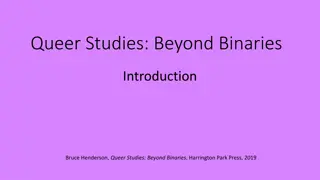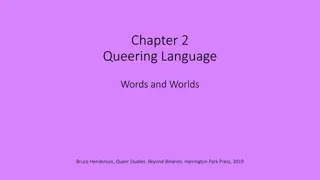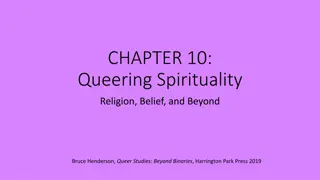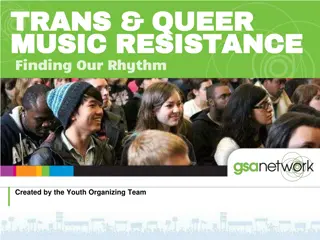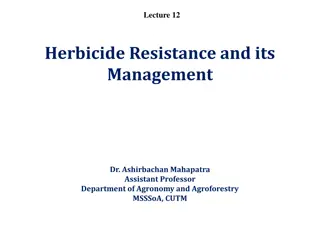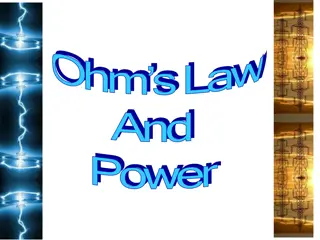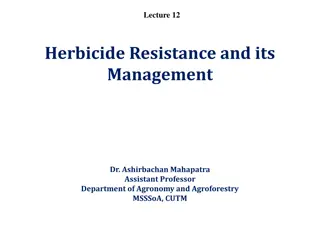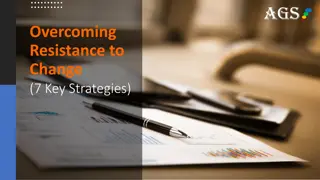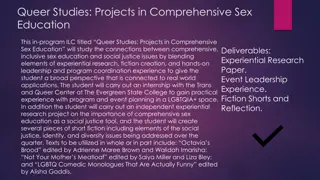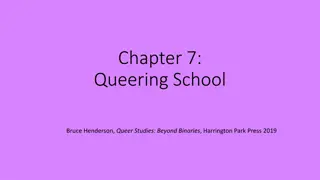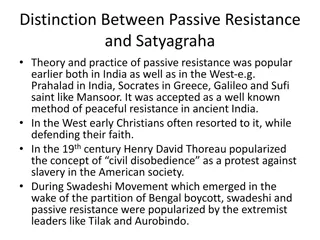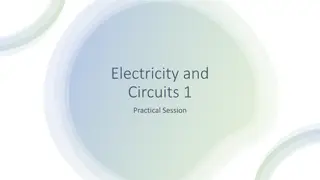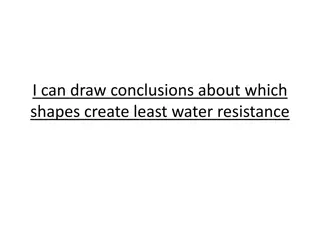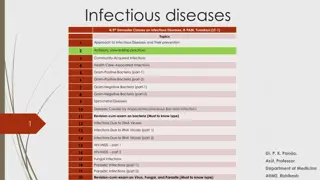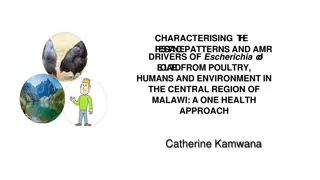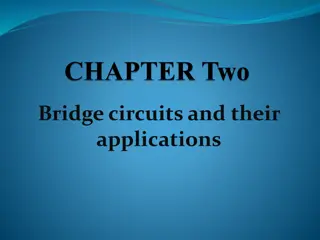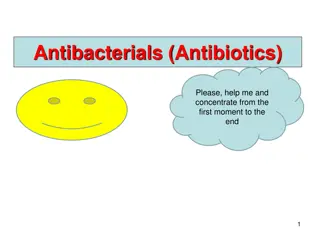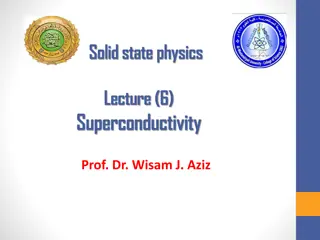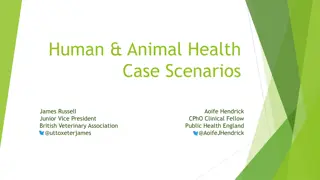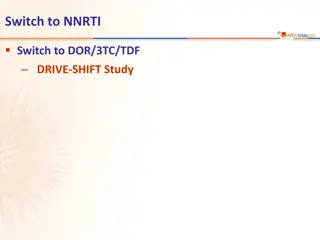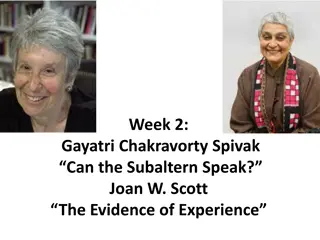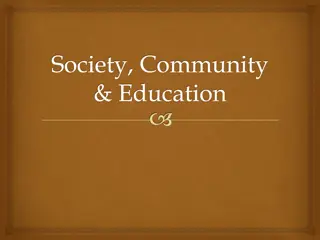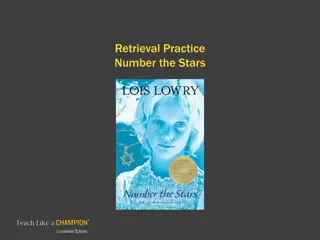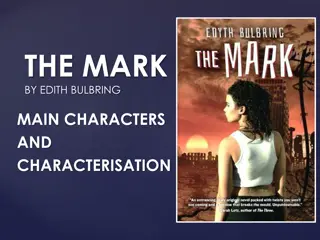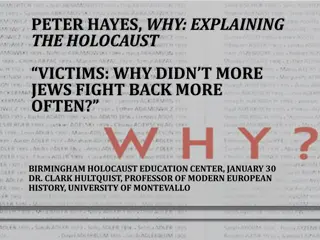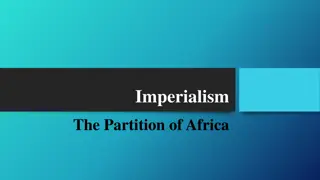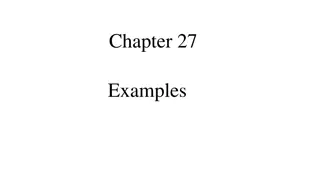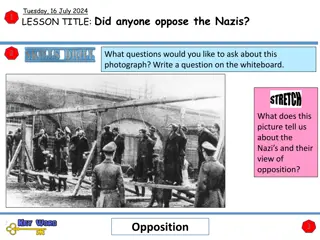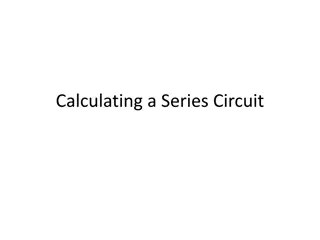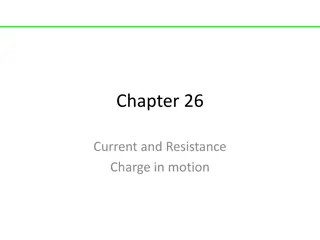Queer Temporalities and Resistance in Contemporary Society
Explore the concept of queer temporalities and resistance in the modern world through discussions on rewiring senses of time, challenging heteronormative ideologies, and embracing non-linear narratives. Delve into the complexities of age, body, and cultural perceptions of time as they relate to individual experiences. Engage with theories on the death drive, future constructions, and the subversive nature of queerness in societal structures.
Download Presentation

Please find below an Image/Link to download the presentation.
The content on the website is provided AS IS for your information and personal use only. It may not be sold, licensed, or shared on other websites without obtaining consent from the author. Download presentation by click this link. If you encounter any issues during the download, it is possible that the publisher has removed the file from their server.
E N D
Presentation Transcript
Queer temporalities (how to rewire the senses re. time) in Dinshaw et al. Cf. Judith Halberstam in the Dinshaw roundtable: the dark nightclub, the perverse turn away from the narrative coherence of adolescence early adulthood marriage reproduction child rearing retirement death, the embrace of late childhood in place of early adulthood or immaturity in place of responsibility. Nguyen Tan Hoang: queer pedagogy (not only in the classroom and library but also in the park, street, bar, basement, kitchen, chat room, bedroom). Hoang: A sense of belatedness marks the ways in which I have arrived at the present: as a refugee who couldn t get to the final destination, America, soon enough; a gay man who came out after the advent of AIDS (again, too late, having missed the 1970s Fire Island orgies); an artist who is always emerging ; an academic who doesn t want to settle down in any one discipline. [and the insistent particularity of the found footage, perhaps] Carla Freccero: I often work on the dead, and as time goes by I have begun to think of myself as a future dead person writing myself out of my time while time is running out. Before, there was always now (mostly there was now! ) or (back) then, or someday, and then it seemed like the deictics were just that, temporal markers relative to a context. At a certain point (then? now?), they became more absolute: past, present, and future became substantive conditions sometimes related to me and sometimes not.
Dinshaw et al: queer temporalities Do you ever feel out of step with today, the time you live in? Or with your chronological age? Has your body ever taken you out of or complicated your relationship with clock time, or linear time, or conventional life stages? (e.g. through illness, or desire, or expected appearance (e.g. size) or ?) Have you ever felt that your conceptions of time are culturally different from those around you (pace of activity/ action, rhythm of the day, dynamics of conversation, age appropriateness relative to culture, etc)?
Lee Edelman, This Is Kid Stuff, No Future: Queer Theory and the Death Drive, chapter 1 The ideology of the Child [cf. the ideology of Work, for Weeks] only one side permitted on this question. (3) A (queer) alternative to the heteronormative organization of communal relations unthinkable. [Cf. Kern/ Futurism the idea in Edelman s terms of reproductive futurism once again aligns this emphasis on futurity with a kind of fascism, or at least totalizing ideology. With the Futurists young adulthood (and masculinity) were privileged; in Edelman s reading of his present, children (and heteronormative family) have the prerogative on how the future should look (and why it s so important)] Queerness: the place of the social order s death drive: a place of abjection but also resistance. Resists linear narrative itself and the promise of meaning revealing itself through time. (In Edelman s lovely sentence in Dinshaw et al: the promise of sequence as the royal road to consequence ). [Cf. narrative form like Bildungsroman (novel of (spiritual) education) so tied up historically with heteronormative development need for new literary forms]
Queer negativity The negative refusing what is constituted as good [and progress , even the future itself] by the prevailing order Focus instead on what Edelman calls (via Lacan) the insistent particularity of the subject, impossible to fully articulate and tending toward the real (Lacan) . [Lacan s Real exists outside the Symbolic order (the mechanisms of meaning-making and Law , broadly defined), a little like the Freudian Id.] Lacan s idea of Truth , which Edelman appropriates, resists the generalization that produces social versions of truth (laws, maxims, common sense , any form of knowledge or wisdom that generalizes) and embraces instead the stubborn particularity . [Q]ueer negativity, then, refuses to reinforce some positive social value; instead constituting a radical challenge to the very value of the social itself. Think about how this might work in relation to the idea of the family, marriage, sex/sexuality, pregnancy/reproduction in The Argonauts.
The Queer Death Drive When Sigmund Freud originally posited the death drive in Beyond the Pleasure Principle (1920), he was partly thinking of the already familiar notion of a thirst for annihilation . the death drive names what the queer, in the order of the social, is called forth to figure: the negativity opposed to every form of social viability (9) Edelman in Dinshaw et al: we aren t, in fact, subjects of history constrained by the death-in-life of futurism and its illusion of productivity. We re subjects, instead, of the real, of the drive, of the encounter with futurism s emptiness, with negativity s life-in-death. Edelman s book poses an urgent question: what would a theory look like which is not oriented toward a better future ? Could there be a politics of the death drive?
Edelmans child(lessness) and the future The pervasive trope of the child as figure for the universal value attributed to political futurity The image of the child rests on unstable ground the vision it hopes to realize is rooted in an imaginary past The marriage of identity to futurity in order to reproduce the social subject before we supply once more the assurance that ours is not another kind of love but a love like his nonetheless, before we piously invoke the litany of our glorious contributions to civilizations of East and West alike, dare we take a moment and concede that the queerness of queer theory should tend precisely toward the such a redefinition of civil order itself through a rupturing of our foundational faith in the reproduction of futurity. To live outside the cycles of reproduction exist intransitively, in a uniquely queer way
Maggie Nelson, The Argonauts Parallel temporalities: Child gestating, being born and growing (including early illness) Pregnancy within a queer relationship, and becoming a mother (as far as that concept is operational here) Relationship beginning and growing into a nuptial Transitioning F to M (which is also not going anywhere , as Harry puts it Death and grieving (the loss of Harry s mother) What form does Nelson s memoir (?) take and how does it accommodate these different trajectories?
53: I am blessed with the time and the desire to hold Iggy until he slips off, and so I do. I wait and wait and wait until I hear a sleep rattle enter his breath, I watch his eyes flutter open and closed, open and closed, a hundred times [ ] I know from raising my stepson that this ritual won t last forever Iggy s babyhood is already speeding away. By the time this book is published, it will be gone. Sturdy pilot, he flips over the coffee table and rides. 103: You pass as a guy; I, as pregnant. Our waiter cheerfully tells us about his family, expresses delight in ours. On the surface, it may have seemed as though your body was becoming more and more "male," mine more and more "female." But that's not how it felt on the inside. On the inside, we were two humans undergoing transformations beside each other bearing loose witness. In other words, we were aging 112: On more than one occasion, a service member in the airport literally saluted me as I shuffled past. Their friendliness was nothing short of shocking. You are holding the future; one must be kind to the future (or at least a certain image of the future, which I apparently appeared able to deliver, and our military ready to defend). So this is the seduction of normalcy, I thought as I smiled back, compromised and radiant. 115: Babies grow in a helix of hope and fear; gestating draws one but deeper into the spiral. It isn t cruel in there, but it s dark.
Queer Time Judith Halberstam: queer uses of time and space develop in opposition to the institutions of family, heterosexuality, and reproduction. Queerness itself is an outcome of strange temporalities, imaginative life schedules, and eccentric economic practices. It is inflected by time-warping experiences as diverse as coming out, gender transitions, and generation- defining tragedies such as the AIDS epidemic. (Editorial on Queer time available via JStor: Queer Time -- the Alternative to Adulting)
Polyphonous time and space (Dinshaw) Three groups of three/four Write a few lines in response to one of these questions: 1. Name and describe a space (like Halberstam s nightclub) that is outside of heteronormative, (re)productive, linear, forward-oriented time (and why it feels as though it is so) 2. Caroline Dinshaw talks (in the context of her work as a queer mediaevalist) about touching across time, collapsing time through affective contact between marginalized people now and then, and [ ] with such queer historical touches [forming] communities across time . Write about a connection/identification you have made with someone from a different time (a character, a writer, a thinker, a historical figure) - not necessarily marginalized and how it shapes your sense of yourself or a group you identify with or your perception of the present. 3. Write about an example of when someone / some group has used the past to justify a particular ideology, or political or social act or position, in the present.


